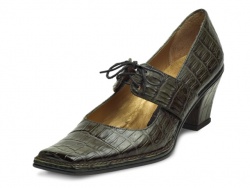Difference between revisions of "Alligator leather"
m |
m (→Alligator leather) |
||
| Line 5: | Line 5: | ||
==Alligator leather== | ==Alligator leather== | ||
| − | Alligators | + | Alligators may look very similar to [[crocodile leather|crocodiles]] but, in fact, they come from a different type of animal family. The various anatomical differences between the two species are very similar to the degree of differences between mice and rats. Because the metabolism of alligators is much slower than that of crocodiles, their lifespan is usually twice as long. |
| Line 16: | Line 16: | ||
<p> </p> | <p> </p> | ||
| − | Alligators are | + | Alligators are found in the marshes, lakes and rivers of North America (Mississippi) and China. Chinese alligators usually measure 1.8 meters in length, while the American variant can reach six meters. |
| − | Unruly hunting practices predominantly for leather production meant their numbers were greatly reduced for a long time. However, since [[CITES - Convention on International Trade in Endangered Species of wild fauna and flora|CITES (Convention on International Trade in Endangered Species of wild fauna and flora)]] came into force in the 1970s, alligator stocks in the USA and China have risen again. . | + | Unruly hunting practices, predominantly for leather production, meant their numbers were greatly reduced for a long time. However, since [[CITES - Convention on International Trade in Endangered Species of wild fauna and flora|CITES (Convention on International Trade in Endangered Species of wild fauna and flora)]] came into force in the 1970s, alligator stocks in the USA and China have risen again. . |
| − | In the United States, their population has | + | In the United States, their population has grown from approximately 100,000 to 1.5 million alligators. In addition, 500,000 alligators are kept in breeding stock in the USA. Each year, approximately 33,000 hides of free-ranging alligators are processed in the USA and approximately 275,000 of breeding alligators. 85 percent of them come from Louisiana. |
Revision as of 12:16, 23 January 2017
Contents
Alligator leather
Alligators may look very similar to crocodiles but, in fact, they come from a different type of animal family. The various anatomical differences between the two species are very similar to the degree of differences between mice and rats. Because the metabolism of alligators is much slower than that of crocodiles, their lifespan is usually twice as long.
Alligator leather bag from approximately 1940 and a bag with integrated head of the alligator from the 50's.
Alligators are found in the marshes, lakes and rivers of North America (Mississippi) and China. Chinese alligators usually measure 1.8 meters in length, while the American variant can reach six meters.
Unruly hunting practices, predominantly for leather production, meant their numbers were greatly reduced for a long time. However, since CITES (Convention on International Trade in Endangered Species of wild fauna and flora) came into force in the 1970s, alligator stocks in the USA and China have risen again. .
In the United States, their population has grown from approximately 100,000 to 1.5 million alligators. In addition, 500,000 alligators are kept in breeding stock in the USA. Each year, approximately 33,000 hides of free-ranging alligators are processed in the USA and approximately 275,000 of breeding alligators. 85 percent of them come from Louisiana.
Leather shoes made of alligator leather from Jacob, F. Schuhe.
Caiman leather - Caiman skin
Caimans are a subspecies of the alligators and are mostly found in South America and partly in Central America.
Caiman from the Pantanal in Brazil.
Skin of the Cayman.
Video about leather of different animal species
Leather of different animal species - Exotic leather
Other exotic leather
- Alpaca fur
- Antelope leather
- Armadillo leather
- Bird leather
- Bull testicles
- Camel leather
- Carpincho leather
- Cat fur
- Chicken leather
- Crocodile leather
- Dog leather
- Donkey leather
- Elephant leather
- Fish leather: Eel, shark, salmon, moray eel, stingray and many others
- Frog leather - Toad leather
- Giraffe leather
- Hippo Leather
- Horsehide - Horse leather
- Kangaroo leather
- Llama Fur
- Lizard leather
- Ostrich leather
- Pangolin leather
- Peccary leather
- Rumen leather
- Sealskin leather
- Snakeskin
- Turtle skin
- Walrus leather
- Yak leather
- Zebra hide














 a kotori web solution
a kotori web solution